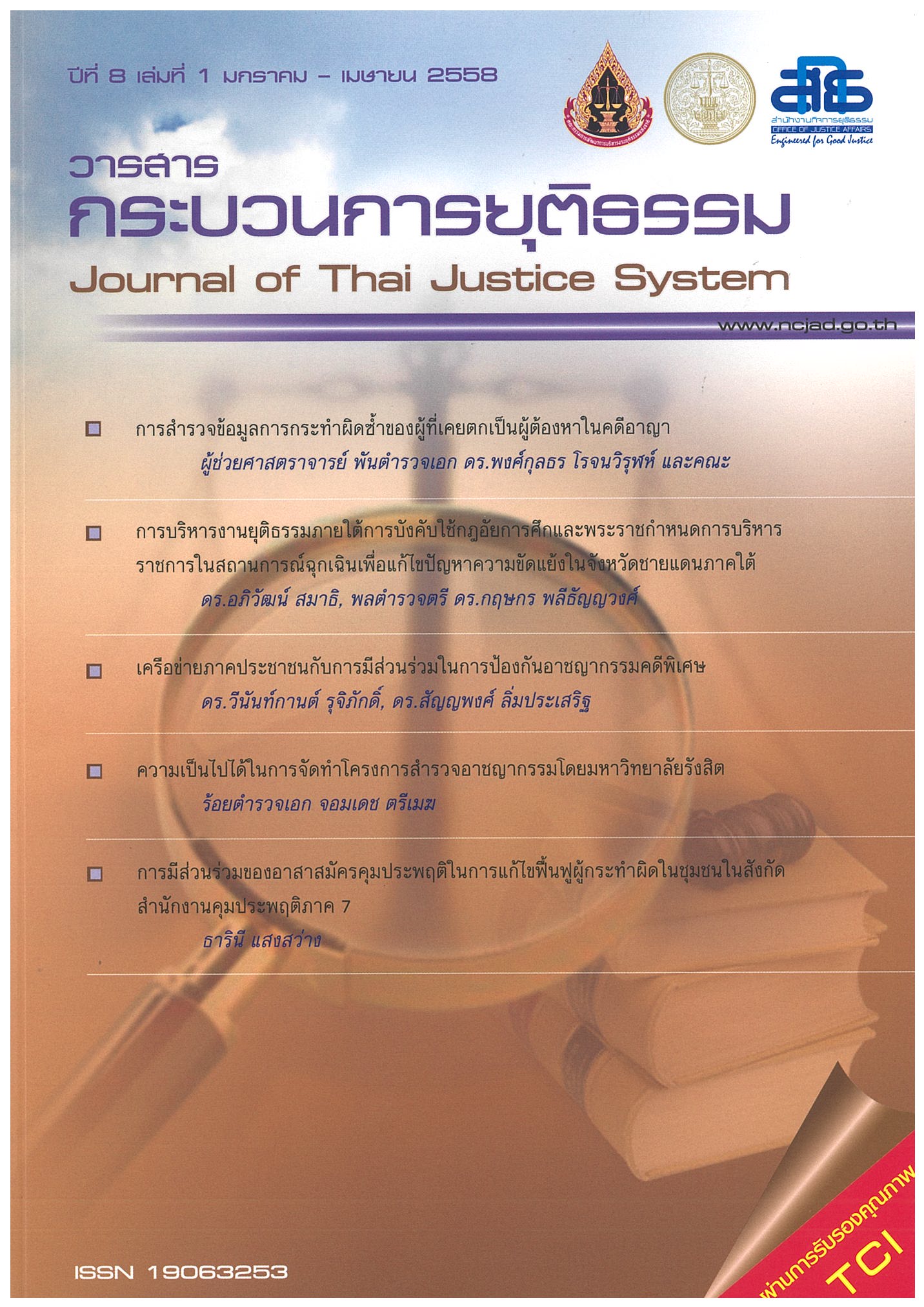เครือข่ายภาคประชาชนกับการมีส่วนร่วมในการป้องกันอาชญากรรมคดีพิเศษ
Main Article Content
บทคัดย่อ
รายงานการวิจัยเชิงคุณภาพนี้มีวัตถุประสงค์เพื่อศึกษารูปแบบการมีส่วนร่วมของเครือข่ายภาคประชาชนในการป้องกันอาชญากรรมคดีพิเศษสาเหตุของการมีส่วนร่วมในการป้องกันอาชญากรรมคดีพิเศษ ปัญหาและอุปสรรคในการดำเนินงาน รวมทั้งแนวทางในการพัฒนาพัฒนาการดำเนินงานด้านการมีส่วนร่วมของเครือข่ายภาคประชาชนให้มีประสิทธิภาพในการป้องกันอาชญากรรมคดีพิเศษ กลุ่มตัวอย่างในการศึกษาได้แก่แกนนำกลุ่มเครือข่ายภาคประชาชนในการป้องกันอาชญากรรมคดีพิเศษ ในเขตกรุงเทพมหานครและต่างจังหวัด ได้แก่ ลพบุรี เพชรบุรี สมุทรสาคร เพชรบูรณ์ พิษณุโลก สระแก้ว สงขลา ตาก และ ราชบุรี การเก็บรวบรวม ข้อมูลโดยการสัมภาษณ์เจาะลึกทั้งหมด จำนวน 15 คน และการสนทนากลุ่มทั้งหมด 10 กลุ่มๆ ละ 3 - 5 คน ผลการศึกษาพบว่าปัจจัยของการเข้ามามีส่วนร่วมเป็นเครือข่ายภาคประชาชนของกรมสอบสวนคดีพิเศษสามารถสรุปปัจจัยหลัก คือ 1) ความปลอดภัย คือ ต้องการให้ชุมชนที่อยู่อาศัยมีความปลอดภัย ปราศจารอาชญากรรมและสิ่งไม่ดีในชุมชน 2) การรับรู้ในเชิงบวก คือ การได้รับข้อมูลข่าวสารที่เป็นประโยชน์ต่อการตัดสินใจ เช่น ข้อมูลด้านการปฏิบัติงานของกรมสอบสวนคดีพิเศษ บทบาทหน้าที่ของการเป็นเครือข่ายภาคประชาชน 3) ประสบการณ์การทำงานเครือข่าย คือ การเป็นเครือจ่ายภาคประชาชนของหน่วยงานอื่นมาก่อน ทำให้เข้าใจในกระบวนการดำเนินงาน และ 4) ภาพลักษณ์ขององค์กร คือ เครือข่าย ส่วนหนึ่งมีความเชื่อมั่นในการดำเนินงานองค์ คือกรม สอบสวนคดีพิเศษ ส่วนรูปแบบในการมีส่วนร่วมของเครือข่ายภาคประชาชนในการป้องกันอาชญากรรมคดีพิเศษ สามารถสรุปได้เป็น 2 ประเด็นคือ การมมีส่วนร่วมเชิงป้องกัน คือการมีส่วนร่วมในการเฝ้าระวัง การสอดส่องดูแล อาชญากรรมที่เกิดขึ้นในชุมชน โดยการใช้ระบบการควบคุมทางสังคมในการดูแล และป้องกันสมาชิกในครอบครัว ชุมชน และประชาชนเองและการส่วนร่วมเชิงปราบปราม คตือ เมื่อการกระทำผิดเกิดขึ้นในชุมชน ซึ่งเป็นคดีพิเศษ เครือจ่ายก็จะแจ้งข่าว หรือการแจ้งเหตุการกระทำผิดไปยังกรมสอบสวนคดีพิเศษได้มาดำเนินการในการจับกุมผู้กระทำผิด พร้อมทั้งการเก็บพยานหลักฐานเบื้องต้นของผู้ที่กระทำความผิดเบื้องต้นเท่าที่จะกระทำได้ ข้อเสนอแนะจากการศึกษาพบว่าการมีส่วนร่วมของประชาชนกับหน่วยงานภาครัฐในการป้องกันอาชญากรรมควรมีการประสานงานร่วมกัน และ ควรมีการสร้างความตระหนักให้กับประชาชนในชุมชนนการสร้างความสงบสุข ปลอดภัยให้เกิดขึ้นในชุมชน รวมทั้งการสนับสนุนการดำเนินงานด้านเครือข่ายจากภาครัฐอย่างต่อเนื่อง
Article Details
ต้นฉบับที่ได้รับการตีพิมพ์ในวารสาร เป็นลิขสิทธิ์ของวารสารกระบวนการยุติธรรม แต่ความคิดเห็นที่ปรากฏในเนื้อหาของบทความในวารสารกระบวนการยุติธรรม ถือเป็นความรับผิดชอบของผู้เขียนแต่เพียงผู้เดียว
เอกสารอ้างอิง
กิตติพงษ์ กิตยารักษ์. (2544). ยุทธศาสตร์การปฏิรูปกระบวนการยุติธรรมทางอาญาไทย. กรุงเทพฯ : โรงพิมพ์เดือนตุลา.
เกรียงศักดิ์ เจริญวงศ์ศักดิ์. (2543). การจัดการเครือข่าย: กลยุทธ์สำคัญสู่ความสำเร็จของการปฏิรูปการศึกษา. กรุงเทพฯ: บริษัทซัตเซสมีเดีย จำกัด.
จารุวรรณ ชาวศรีทอง. (2546). การมีส่วนร่วมของประชาชนนกระบวนการยุติธรรม : รูปแบบปัญหาอุปสรรคและแนวทางในอนาคต. รายงานการวิจัย สำนักนโยบายและยุทธศาสตร์ สำนักงานปลัดกระทรวงยุติธรรม.
จิราภรณ์ ศรีคำ. (2547). การมีส่วนร่วมของผู้ปกครองในการพัฒนาการจัดการศึกษาของโรงเรียนวชิรวิทย์ ระดับประถมศึกษาจังหวัดเชียงใหม่.
เฉลิมเกียรติ ศรีวรขาน. (2555). นวัตกรรมกระบวนทัศน์การป้องกันอาชญากรรมของตำรวจไทยในศตวรรษที่ 21. นนทบุรี : เอส.อาร์.พริ้นติ้ง แมสโปรดักส์.
ชัชชัย ไหมวันทา. (2551). การมีส่วนร่วมของประชาชน ต่อการควบคุมและป้องกันอาชญากรรมในเขตท้องที่ สน. ราษฏร์บูรณะกรุงเทพมหานคร. วิทยานิพนธ์ศิลปศาสตร์มหาบัณฑิต สาขาวิชารัฐประศาสนศาสตร์ มหาวิทยาลัยมหิดล.
ปาริชาติ วลัยเสถียร. (2547). (บรรณาธิการ). เครือข่าย : ธรรมชาติ ความรู้ และการจัดการ. กรุงเทพฯ : โรงพิมพ์เดือนตุลา.
ประภาพรรณ อุ่นอบ. (2552). เครือข่าย: กลไกสำคัญในการขับเคลื่อนงานพัฒนาอย่างบูรณาการเชิงพื้นที่. กรุงเทพฯ: หจก. เอส.พี.กราฟฟิค พรีเพรส พริ้นติ้ง.
ทัษนีย์ ไทยาภิรมย์. (2526). "การพัฒนาชุมชนวิธีการระดมการมีส่วนร่วมของชุมชน" นิตยสาร ประชาสงเคราะห์. ปีที่ 26 ฉบับที่ 4 (ก.ค.-ส.ค. 2526.)
พีระ พรนวม. (2544). ศรัทธาต่อหลักการการมีส่วนร่วมในการจัดการศึกษาของผู้บริหารโรงเรียน สังกัดสำนักงานการประถมศึกษาอำเภอแม่ทา จังหวัดลำพูน. วิทยานิพนธ์การบริหารการศึกษามหาบัณฑิต
ไพบูลย์ วัฒนศิริธรรม และ พรรณทิพย์ เพชรมาก. (2551). การบริหารสังคม ศาสตร์แห่งศตวรรษเพื่อสังคมไทยและสังคมโลก. กรุงเทพฯ: สถาบันพัฒนาองค์กรชุมชน.
ไพรัตน์ เตชะรินทร์. (2527). "นโยบายและกลวิธีการมีส่วนร่วมของชุมชนในยุทธศาสตร์การพัมนาในปัจจุบัน" ทวีทอง หงส์วิวัฒน์ (บรรณาธิการ). การมีส่วนร่วมของประชาชนใน การพัฒนา. กรุงเทพฯ : ศักดิ์โสภาการพิมพ์.
พรชัย ขันตี. (2553). ทฤษฎีอาชญาวิทยา : หลักการ งานวิจัยและนโยบายประยุกต์. กรุงเทพฯ : ห้างหุ้นส่วนจำกัด สุเนตร์ฟิล์ม.
พงษ์ธร ธัญญสิริ. (2552). กระบวนการยุติธรรมการมีส่วนร่วมของประชาชนยุติธรรมชุมชน.กรุงเทพฯ:สำนักงานปลัดกระทรวงยุติธรรม กระทรวงยุติธรรม
พิชิต พิทักษ์เทพสมบัติ และ ปาริชาติ พงษ์ชัยศรี. (2553). ความยุติธรรมในความคิดเห็นของหัวหน้าครัวเรือนในชนบทไทย. วารสารกระบวนการยุติธรรม. ปีที่ 3 เล่มที่. 89-108.
ยุติธรรมชุมชน หนทางสู่สังคมแห่งความเป็นธรรม: รายงานการสัมมนาทางวิชาการเรื่อง วันจันทร์ที่ 9 เมษายน พ.ศ. 2550 ณ ตึกสันติไมตรี ทำเนียนรัฐบาล
วันชัย วัฒนศัพท์. (2543). การมีส่วนร่วมของประชาชนในการตัดสินใจชุมชน. (เจมแอลเครตัน). กรุงเทพฯ: ศูนย์สันติวฺิธีเพื่อพัมนาประชาธิปไตย สถาบันพระปกเกล้า.
สากล สถิตวิทยานนท์. (2532). ภูมิศาสตร์ชนบท. กรุงเทพฯ : โรงพิมพ์ไทยวัฒนาพานิช
สำนักงานคณะกรรมการพัมนาระบบราชการ. เข้าถึงข้อมูลวันที่ 22 ธันวาคม 2556 จาก http://www.opdc.go.th/
เสรี พงศ์พศ. (2548). วัฒนธรรมองค์กรของงโลกยุคใหม่ เครือข่าย ยุทธวิธีเพื่อประชาคมเข้มแข็ง ชุมชนเข้มเเข้ง. กรุงเทพฯ: เจริญวิทย์การพิมพ์.
ศูนย์เครือข่ายและพันธมิตรภาคประชาชน. (2556). คู่มือเครือข่ายดีเอสไอภาคประชาชน. กรุงเทพฯ: กรมสอบสวนคดีพิเศษ.
อคิน ระพีพัฒน์. (2527). การมีส่วนร่วมของประชาชนในการพัฒนา. กรุงเทพฯ : ศักดิ์โสภาการพิมพ์.
อัณณพ ชูบำรุง. (2528). การมีส่วนร่วมของประชาชนในกระบวนการยุติธรรมในปัจจุบัน ในรายงานการวิจัยเรื่อง การมีส่วนร่วมของประชาชนในกระบวนการยุติธรรมในปัจจุบัน: รูปแบบปัญหาอุปสรรคและแนวทางในอนาคต. กรุงเทพฯ: โรงพิมพ์ชุมนุมสหกรณ์แห่งประเทศไทย จำกัด.
อัจฉราพรรณ จรัสวัฒน์. (2550). ความเชื่อมโยงของเครือข่ายยุติธรรมชุมชนกับการบริหารราชการจังหวสัดแบบบูรณาการและการกระจายอำนาจสู่ท้องถิ่น. (กรุงเทพฯ: กระทรวง ยุติธรรม)
Cohen, J.M., Uphoff, N.T. (1980). "Participation's Place in Rural Development Seeking Clarity Through Specificity" World Development. Vol.8.
Cox, S. and Wade, J.E. (1998). The Criminal Justice Network : an Introduction. Boston : McGraw-Hil
International Association for Public Participation เข้าถึงข้อมูลวันที่ 10 ตุลาคม 2556. จาก www.iap2.org/


